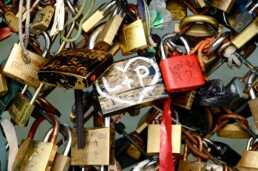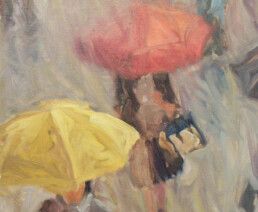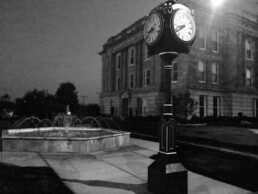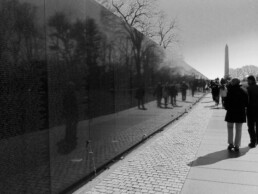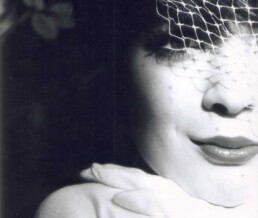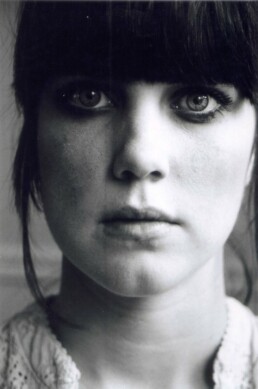Painted on the Seine
by T. Allen Culpepper
Unreal city rising from the river and veiled in mist,
not Eliot’s grey and sickly-yellow urban desolation
rendered in sharp, black mechanically-struck words,
not Eliot’s vast, impersonal Thames-banked London at all,
but Monet’s Vetheuil, a village of pink, peach, and lavender
perched above a Seine of dappled blues and greens,
the town’s structures clustered as if drawn together
and upward by the tower of its church, the scene
not really even drawn but somehow brushed into being
without outline by human hand deftly dabbing paint,
reflection in the water no fainter than the upright
image that it mirrors with perfect imperfection,
a fairy city that might not be there at all.
The Dante Alienation
by Laurel Dowers
“We had a great week!” I announced to my cousins as I slammed the cash drawer closed.
Another tidy stack of cash and checks were ready to drop, and it was time to go home after a satisfying week. I flashed a triumphant smile at Steph, who was supervising Audra’s window-cleaning progress.
“Well, yeah!” Steph retorted with a hint of hostility. “Auntie Liv hasn’t been around to scare off the customers—crazy old bird.” Audra stepped aside as Steph leaned into the window and examined it closely, frowning. “You missed a spot.”
Audra huffed and stepped back to the window, pretending to be offended while wildly scrubbing at the glass.
I surveyed the store with appreciation. Seattle’s chilly, rainy, late-fall weather hadn’t dampened the holiday shoppers’ spirits, and the atmosphere within the store had never felt more cheerful. Our aunt had migrated south to Hawaii a month ago, abandoning us to prepare for the Christmas season on our own. We went on a cleaning and organizing adventure, determined to improve the look of the store. Liv enjoyed that overstuffed, junky bookstore look, but it was a dusty nuisance for customers and coworkers to navigate. I took my newly appointed managerial responsibilities to heart and decided to change that.
Now the shelves and displays were more streamlined. The overall look of the store was cozy and inviting. We even found enough room to bring in a pair of overstuffed chairs and a couple of tables Steph had found in her mother’s attic. My cousins and I became a team as we worked toward a shared goal: to take over the store when Liv finally did humanity a favor and retired her scrawny butt to an old folk’s home.
“Oh, Tara, I forgot to tell you the toilet’s stuck again,” Audra remarked offhandedly.
Steph’s shoulders slumped as she let out a groan. “We need to call that plumber my mom recommended.” She started toward the back room to survey the damage.
“After the week we’ve just had, we might be able to do that,” I agreed. When Liv ran off with that fat oil slick she married, she also cleaned out the store’s bank account. We’d barely had enough money to cover the utilities and our paychecks. We scrimped where we could, but the profits were small and the problems were many: ancient toilet, crummy electrical wiring, leaky roof. The saving grace was that the landlord—owner of the building and Luigi’s Deli next door—didn’t charge much for rent. As long as the place didn’t flood or burn to the ground, we could make it.
“Sooo much overstock!” Steph complained. “I can’t get through!”
“Squeeze through the path along back wall!” Audra called to Steph. “Over by the sale signs!” Audra squealed and stopped mid-swipe across the glass. She whirled around to face me, her flippy red ponytail slapping her face, eyes wide with sudden excitement.
“Blow out sale!” she whispered with uncontrolled exuberance. “Get rid of it all!”
Why hadn’t we considered this before? Aunt Liv hated sales—or any event where she had to discount something. She hated even more anything termed a blowout. Said it reminded her of greasy truck drivers leaving their tire parts all over the freeway.
“I don’t think we’ve cleared enough to cover a toilet and a big advertising campaign.” I envisioned fancy-pants ads in local papers, periodicals, TV stations. Pipe dreams.
“Fliers. Put them in, like, libraries and grocery stores and stuff.” Audra cleaned faster and harder as she lapsed into thoughtful silence. “Dante can help.”
I snorted. They couldn’t be serious. Dante? That short-stack? That second-generation Italian, salami-slicing spawn of Luigi? The creep who whistled at my cousins and verbally abused my parking skills every morning? Audra always dissolved into childish giggles at his attentions. Steph was smart enough to blow him off, but she smiled when she thought no one was looking. He just completely infuriated me.
“Well…he is good with graphics!” Steph pondered aloud.
“He’s good at being an ass,” I spouted. “And we’re not asking him for help.”
Dante contributed to the downfall of my relationship with my ex-boyfriend. In retrospect, though, I wondered if we weren’t already headed for disaster. Andrew and I were already on rocky ground last summer. The last straw was when he wouldn’t spend July 4th with my family—with Liv, specifically.
There was no better place to watch fireworks than from Liv’s houseboat on Elliott Bay. I tried to convince Andrew to go, but he wouldn’t budge. He spent the holiday land-bound with his family. I spent the holiday dodging Dante’s advances, needling Liv about why Dante was there (she refused to answer).
When Dante saw Andrew and me a week later, standing outside the Space Needle arguing about whether to have dinner in the SkyCity Restaurant, Dante just couldn’t resist being an ass again. He spent five minutes taunting Andrew about missing Liv’s houseboat party. He winked at me numerous times, constantly touched my back, squeezed my shoulder…and then planted a big, sloppy kiss on my mouth! Shocked, I staggered backwards while Dante made some crack about getting to know each other better over the holiday. All I could do was stare as he strutted off like some Italian stud.
Andrew thought my surprise meant I was besotted with Dante. I tried to explain that it was Aunt Liv’s hair-brained idea to include Luigi and his spawn—to no avail. Now I’ve heard Andrew has started dating Crazy Daisy, the creepy girl from high school. Crazy Daisy, who had stalked him all during high school, fawned over him, called him Andy Pandy. That ditz with her Cyndi Lauper skirts poking out everywhere.
“Oh, let it go, Tara!” Steph interrupted my thoughts. “Andrew was too stuffy for you.”
“Yeah, and quit being mean to Dante,” Audra joined in on Steph’s verbal bandwagon.
Who was being mean to whom? I was the one left looking unfaithful that day. I was the one who lost her boyfriend.
I sucked in a large breath, ready to state just that, when the door to the shop flew open. A frigid burst of fall wind swirled through the store. We all looked up. There she was in all her vintage-inspired splendor, from her red A-line dress to the black, high-heeled, fur-trimmed ankle boots encasing her feet. Her wild red curls were slipping out of a French twist. For a moment I couldn’t believe she was really there, standing in the store she’d abandoned in her wing-flapping frenzy to get to Hawaii with her new husband. Aunt Liv.
“Hello my little birds!” she crowed as she sized us up. Her eyes landed on Steph as she tumbled out of the backroom, dust bunnies clinging to her apron and her hair. “Oh my, this is how you dress for customers? What would our male demographic think?”
The three of us held our breath. We seemed unable to reconcile the vision before us with the fact that Aunt Liv was so totally…not supposed to be here right now. Especially now, when we’d been discussing options for getting rid of her junk.
Liv glanced at Audra and made some off-handed comment about her “frizzy hair.” (The same frizzy hair we all possessed, Liv included.) Next, she looked me up and down.
“I see those diet supplements I gave you didn’t work?”
An odd sound filled the air. A soft ffffffffffffffff, like air being slowly squeezed out of a tiny hole in a plastic bag. It took a moment before I realized the sound was coming from me. My face burned and my body twitched as I made the sound again. Ffffffffffffffffffffffffffff!
“Aunt Liv,” Steph began calmly, but I horned in.
“What the fffffff—!” My voice creaked under the weight of suppressed rage as I managed to bite off the rest of the word. “What the hell are you doing here, woman?” The words spewed from my lips.
Liv’s pale copper eyebrows quirked up at the outburst. Her only reply was to smirk as her eyes roamed around the now-clean store. Indignant outbursts only served to amuse Liv instead of censure her. There was no such thing as shaming Aunt Liv.
“What have you girls done to my store?” Her eyes widened as she took in the store. Looking past me, she gasped. A pale, claw-like hand tipped with crimson talons waved toward the back counter. “Where are all the books?”
She continued to turn, look, turn, look. Stringy muscles and bulging veins rippled under the skin of her neck as her head swiveled.
“Tara, are those the horrid chairs your mother bought when you were still in diapers?!”
“We cleaned,” Steph cut in flatly. “We made it cozy.”
Aunt Liv cocked her head and pursed her beak-like lips. Her beady little eyes lit on each of us.
“Well!” our aunt chirped after a moment’s silence. “I’m closing the store, so all that work was for nothing. What a pity.” A skinny arm shot out, red claws snatching up the deposit bag before I knew what she was doing.
“In fact,” she added as she stepped toward the door, “I’ve already sold. To Luigi.” Liv yanked the door wide open and swept back outside, chuckling as she left.
The weekend that followed was terrible. It’s not every day your hopes and dreams, your future plans for the rest of your life, are smashed to pieces in the space of a few minutes. Not only had I lost any chance of buying the store, but now I couldn’t even have the blasted toilet fixed.
To say I was upset would be an understatement. I cried. I sobbed. I bawled my eyes out. When I was finished crying, I started over. Sometime Sunday afternoon, I realized I hadn’t eaten, so I rescued the half-gallon of vanilla ice cream from the freezer, covered it in Rice Krispies, and had dinner. Then I cried a little more.
I couldn’t understand what an Italian deli owner who barely spoke coherent English would want with a second-hand bookstore. Was he planning to expand his deli? Maybe he wanted to clear out the books and rent the spot to someone who would pay more rent. Was the old coot exacting revenge because he hated Liv so much? Or, was he seeking revenge because he was secretly in love with Liv and she had run off with the grease ball?
Liv didn’t give any instructions on what to do next. Steph, Audra, and I agreed to show up Monday morning and take it one day at a time. Now, here I stood, staring at the front door of what was once going to be my life.
“Hey, Bookworm!” someone called from several feet away. Oh, gosh, no! Not Dante. Not this morning. “Fine parking job today. You almost parked that barge between the lines.”
I couldn’t get in the store fast enough and lock the door behind me, putting that barrier between us, at least for a few minutes. Audra and Steph wouldn’t be in until after lunch. Mondays weren’t as busy, so I took the time to dust a bit, straighten a few skewed books, and look at the empty cash register. I was glad I’d left the register fund in the drawer Saturday night. If I hadn’t, Liv would have gotten away with that, too.
I waited on a few customers, and then resigned myself to call the plumber so I could at least get an estimate on the toilet repairs. Maybe I could convince Luigi to fix the toilet since he now owned everything.
“Hey, Bookworm, what’s the deal with running off like that?”
“Not in the mood, Dante,” I snapped. “Go back to slicing salami and leave me alone.”
Dante leaned against the counter, apparently not leaving anytime soon.
“Hey, Tara, it wasn’t my fault.”
“Excuse me?” I squawked. “Everything is your fault! You wrecked my relationship with Andrew! Your father bought my store out from under from me! I wanted to buy this store! This was my future! My dream!” My voice wavered, tears were seeping in.
“Chill, babe…”
“Chill? I’ll chill when you get out!”
Dante turned for the door and I breathed a sigh of relief. Instead of leaving, though, he locked the door and flipped the closed sign. I bit back a frustrated scream, certain I couldn’t take another minute of his presence—of his mere existence.
“Hear me out, okay?”
I crossed my arms defiantly and glared at him. I sniffed—what I wouldn’t have given for a tissue right then!
“Andrew was already gone. He’d been flirting with my sister, and I saw him out with a couple of different women. They weren’t business associates, Tara. He was two-timing you. All I did was help end it before it turned ugly. Sure I coulda done it differently. But do you think if he really loved you, he would have dropped you so fast? He just needed an excuse.”
I started to call him a few names, to tell him to go to hell, but he held his hand up to silence me.
“Dad knew that Liv was going to unload the store. He’d been talking to her about it for a while. She wanted the money so she could take up permanent residence with her new squeeze.”
Bleh. Mental images I didn’t need.
“He outbid four other people. Four, Tara. He knew the importance of this store to the area, and to you.”
Why was he standing there looking at me? Why wouldn’t he leave?
“You keep running the store just like you always have. What you’re doing is working. Once you are ready financially, come talk to Dad about buying it.”
“What?” I managed to croak—barely audible.
“You come talk to Dad about buying it back. Until then, nothing’s changed.”
And now, Dante was heading back toward the door.
“Oh, I almost forgot. Dad called a plumber—he’ll be here this afternoon to replace the toilet.”
Dante had flipped the sign and unlocked the door, casting a long glance out the window as he eased the door open.
“Who taught you how to park, Bookworm? Gee whiz!”
Then he was gone.
The Visitor
by Lauren Skvarla
There’s no need to knock.
Like each time before, I knew you’d be back,
So, I left the door ajar.
For a moment, as I waited for you to return,
I thought perhaps you’d moved on.
Found another to embrace.
Found another to possess.
I realize I was naive.
Why did I ever trust myself?
Why did I believe you would leave me alone?
But I sense your warmth, and it’s familiar.
I feel your grip, and it’s reassuring.
You are my consistency -- my companion.
They say, “Just don’t listen.”
How can I not listen when your every word permeates, saturates, satiates. Your cries, as I count the minutes.
Your pleas, as I drive in solitude.
Your whispers, as I fall asleep.
Each lie you tell resounds in every word I speak.
Tomorrow, you will hear the slide of the bolt.
Deafening, reverberating, as I lock you out forever.
Then in a day -- a week -- a month --
I’ll crack the door open slowly, cautiously an inch at a time.
When I’m convinced that you’re not coming back,
I’ll step outside.
And you’ll be there waiting for me.
Schismatic Sacrilege
by Brianna Sanow
I was baptized in a bin of recycled water,
brimming with the faults of those doused before me
Maybe I do need Jesus; or perhaps,
I just need a lobotomy
I tried to talk to God, but the line was busy
I pressed two for Español,
and the devil himself answered,
explaining that the Lord doesn’t speak Spanish
Humanity familiar and humanity alien
siphons one another’s spirits up their nostrils
The repercussion of free will
is that we can become each other’s sadistic gods
I will not espouse a doctrine disgraced by promises of jeweled crowns,
or hounded by a demon at the heels of human desire
In the darkness, I will scan the colorless constellation
and await the far-flung flash tucked in the crepuscule
Maybe religion has left a bruise on us all,
or a rash that won’t cease to spread
If Christ could turn water into wine
can we not transform hatred into love?
Carroll After Dark
by Debra Chandler
Don't read Carroll after dark,
Doing so could leave a mark-
In the soul and on the mind;
Many fear what's left behind.
If in the dark you dare not go
For fear of darkness-- don't read Poe.
For in that tiny dreaded hour,
Darkness may your light devour.
Mark your authors, mark them well
For Dante took us straight to Hell,
King to realms of horror deep
And Gygax to the Dragons' Keep.
Herbert birthed the spice of Dune
And Tolkien warred o'er elven rune.
Asimov coined robot law,
And Bradbury the Martians saw.
Madness is not for everyone-
And many writers are undone.
Unless you'd bear the writer's mark--
Don't read Carroll after dark.
Someone Tried To Kill Me On Route Taco: A Glimpse Into the Invisible Wounds of War
by J. Darin Ellis
Throughout my days, there have been countless events that have defined who I am. Very few, however, have changed me quite so radically as the first time someone tried to kill me. The details of my incident on Route Taco, a narrow alternate supply route just North of Baghdad, are simple and few. I'll expound, but the short answer is that someone attacked our convoy with a roadside bomb, my truck was hit and disabled, and our crew survived, relatively unscathed. The fight was brief, only a few shots were fired, and one insurgent was killed. Within minutes of the attack, my truck was hooked up to a wrecker and pulled out of the Kill Sector. The explosion that lifted my truck off the ground, however, had a long lasting effect on me that I never could have imagined.
We were bold and brash, Army Cavalry Scouts, best of the best, or so we told anyone that asked and many that didn't. For most of us in the Centurion Battalion scout platoon, this was our first time outside of our own country, and the most action we had seen as of yet was in a Halo game, and yet, there we were, cruising through the Baghdad slums locked, cocked, and ready to pop. We had been honed for this at Riley and Polk, drilled and drilled to deal with any scenario, until our action was smooth and flawless, living embodiments of the weapons we rested our thumbs on. We were the emissaries of Dubya, sent to fulfill America's destiny as Freer of Captive Nations.
This was just our third trip outside the wire since arriving in Iraq and we had yet to see any real action. To be honest, I had begun to think that this was all an elaborate training exercise taking place in Juarez. It would certainly account for the slums and the brown people that, in my naive, xenophobic mind, could easily be mistaken for Mexicans from a distance. And really, hasn't the military spent taxpayer dollars on more frivolous things? The occasional “Bongo” truck out past curfew was all that we encountered, nothing serious, and no shots fired in anger.
While driving, I remember thinking it strange that, out here in the desert where everything was so brown and dead, there should be a single green bush beside the road as we went barreling from Forward Operating Base Warhorse on Route Taco. Then someone took a picture and the flash lit up the night in a sickening sepia tone. Nothingness engulfed me. As my eyes tried with all their might to refocus, I felt a tug on my sleeve and heard the faintest call from somewhere so far away. I thought it was my wife telling me to wake up, she’d made breakfast. As reality seeped back in, my wife faded away, back to the Kansas prairie, and my LT sounded a little bit clearer as he asked if I was up, if I was alive. I instinctively pushed the accelerator to the floor, but the engine was unresponsive and my truck coasted to a stop. The rest of the platoon circled around me to provide security while we assessed the situation. We were all still alive, the truck commander, the gunner, a comms specialist that had hitched a ride with us, and myself. The bomber had missed his mark, and the only damage was to our Hummvee, Wolf 3.
A fifth of Jim Beam a night. Sometimes more. That's what it took to make the nightmares manageable after I got back. Every time I closed my eyes there was the flashbulb pop and that roaring silence, a football player hit me from behind, and then the fear. Sure, there were other things I saw and did over there that gave me nightmares, but nothing matched the terror of my first time. Nothing ever compares.
The guys laughed and joked, I had gotten my cherry popped. I had literally gone through the fire, and relatively unscathed. I was invincible. The reality was that I didn't sleep for a solid week after that night. The reality is that I still spend sleepless nights rehashing and reliving that run down Route Taco.
There on the road, still a little flash blind and punch drunk, I could smell the burnt accelerant as I scrambled in the dark to hook my crippled HMMWV to the wrecker. My hands fumbled in the dark, shaking from adrenaline, to change the two rear tires that had been shredded by shrapnel so that the truck could be towed. Shots popped off behind me. I remember screaming at the top of my lungs to the gunner two trucks back, “Kill that motherfucker!” There was no way for him to hear me over the din of engines and from my position, but I didn’t care. I hated the insurgent triggerman more than anyone had hated anyone prior and I wanted nothing less than to kill the bastard that had just tried to kill me.
The audacity of a roadside bomb is incredible, simply because it is so impersonal. We didn't know each other, the bomber and me. We had never met. I had never done anything personally to offend him. And yet, he had seen fit to wire an artillery round to a cell phone and make an attempt at sending an infidel to whatever hell he believed I would go to. Was it anti-American ideology that guided him? Some concept of revenge for being wronged by someone else? I could only wonder. As I contemplated the explosion over the next few weeks, I think that the random nature of the act is what appalled me so much. I had known there would be fighting when I signed up. I knew there were bombings every day in Iraq. I had trained for this exact scenario countless times and I acted flawlessly in the midst of chaos. But it really wasn't the attack or my actions during the attack that surprised me. What really shocked me was my reaction to the bombing.
I didn't want to play soldier anymore. I realized that this person, this human being, that had tried to kill me had done the exact same sort of thing I would have done, had the roles been reversed and he had invaded my country. Those feelings made me do the unthinkable: I questioned our presence in Iraq. I questioned war altogether. I never rejected an order or refused to roll out on patrol, but it was all different here. I saw through the bullshit I had been spoon fed, the propaganda stopped working on me. I didn’t buy into the lies anymore about weapons of mass destruction and that we had liberated the Iraqis from an evil dictator. Instead, I saw that the war was less about freeing the oppressed Iraqi people than lining warmongers' pockets.
When you're at war, the last thing that your leaders want to hear is that you don't believe in what you're supposed to be fighting for. I wasn't exactly quiet about my newfound revelation, but I didn't try to raise a stink about it, either. I knew that I was in the desert because I had volunteered to be there. No one forced me to join the army, and if I wanted to make it back I would have to shed blood and fight just like the rest of my brothers. Still, as something like this does, word got around that I was "less than pro-war" and my superiors were more than mildly annoyed with me.
Three weeks after the explosion, my platoon sergeant paced the floor of his makeshift office while I stood silently locked in parade rest. The fall of his boots and a squeaky floorboard were the only sound for several long minutes. My entire body burned from the smoking I had just received, but I struggled to make sure that I held perfect posture. My eyes darted to his desk and I stole a glimpse of my rifle, confiscated and lying next to a copy of emails containing anti-war statements that I had sent to my wife, intercepted and sent back to my highers. I wasn't a shitbird, I didn't deserve to be castrated like this. I may not have believed in the cause anymore, but I definitely believed in my team, my platoon. Emotions swirled violently inside, anger, shame, frustration, as he told another NCO to escort me to mental health. I spoke out of turn, pleading my case, to no avail. Later, I had to force back a smile when mental health ordered them to return my weapon because I wasn't a danger to myself or others. I wanted to smile not only because of the victory, but also because I found it ironic that less than 24 hours prior I had been sitting in the port-a-john with the barrel of a loaded and charged pistol under my chin, trying to muster the stomach to pull the trigger.
It was a dark time for me, the darkest I have ever known. The blast from that explosion resonated throughout the rest of my deployment. It was in the background through every fire fight, every close call, every time I bore witness to the horrors of war. It shaped me and helped me become the killer I would need to be. It was the first step in losing the humanity that I would later fight so hard to regain.
My wife and kids can attest that the man they welcomed home was not the same person they had sent off to war. Almost instantly on my return, my life began to unravel. My marriage went to hell, my kids were terrified of me, and my work suffered immensely. I found it difficult to be in crowded spaces, and I still hate the 4th of July fireworks. I went to counselor after counselor, shrink after shrink. I ate handfuls of antipsychotics, antidepressants, and antianxiety drugs. I washed them down with bottles of booze. I self-medicated with pot, MDMA, psilocybin and LSD. I sought comfort in God, and did not find him. The prescription drugs left me like a zombie, the booze turned me into more of a monster than I already was, and the counselors provided little help, other than teaching me to monitor my breathing. Pot helped me to take my mind off of the mental anguish for a while and gave me a cheerier disposition, but it didn't resolve the issue, it was just a Band-Aid. I was lost. Strangely, I longed to be back in Iraq, where most of the decisions to be made were black and white. There was a bizarre simplicity to life in combat that I secretly wished for again. I felt like I didn’t belong in life at home anymore.
Nowadays, the nightmares aren't as frequent, but the echoes of that explosion still resonate through my day to day life. After 6 years, I'm getting better at living like a normal human being, but it has definitely been a process. The explosion left me partially deaf, and my doctor says it’s likely that the concussive force of the blast permanently rewired the way my brain works. But the irrational fear of being blown up again is what troubles me the most. Sometimes just driving at night will make me sweat, start clenching the wheel as I grit my teeth and scan bridges and overpasses for imaginary bombs. Other combat vets I talk to, if they are honest, share extremely similar stories. The PTSD commercials I see on late night TV ring true; not every scar a veteran has is visible, and certainly, those are the scars that heal the slowest. Someday, my scars may heal, but I've been forever changed because someone tried to kill me on Route Taco.
Jonald and Lepus
by Mason Powell
he had to pick a partner, someone with whom he would canoe down the Moselle River. Eyeing his options, none compelled him. A stout girl with blonde hair waved and flashed her eyelashes at him. He looked onto the next. One by one, the boys quickly chose their matches from the assembly of girls: Carrigan went with Thomas, Juliet with Seth, Frances took Bernard’s hand, and Dawn and Brandy delightedly slipped from tree to tree until the two misses were over a hill and out of sight. But towards the back, among the quiet and nameless, she stood. When he held her in his vision, she looked down at the ground and her hair fanned out. It was the color of the mud at the riverbank. She had pale skin—made rosy on the edges by the sun—that tightly wrapped her thin stature, topped with a unique face, which donned a small nose and exaggerated front teeth.
“You,” he said, extending his left arm and pointing with an upturned palm that shone skyward. The few remaining girls stepped aside. She looked up at him. Her eyes were chartreuse and both specked with red. He confidently beckoned her and he burned feverishly inside. But he was truly afraid and wrapped in a frigid zephyr. She drew forward, brushing shoulders with the silent others. Without thinking, the two climbed into a wooden canoe marked: Lavendula-004 and floated away.
“What’s your name?” he eventually said, in between the soft stroke of his oars.
“Lepus,” was her delayed reply.
“Oh.” He stopped rowing. “What does it mean?”
“My parents named me after the constellation that Orion and his dogs chase across the dark winter sky.” The truth as it was, her usual manner of speaking, she continued. “What’s your name?”
“Jonald.”
“That’s a terrible name.”
A red wave washed across his face, hiding the lighter freckles on his cheeks. As it faded away he laughed at her honesty and curious manners.
“I know. I’ve never liked it.”
“I think it suits you.”
“Truly? You just said that it was a terrible name.”
“It is. But from now on and until forever I won’t be able to see you as anything different. I will think of the boy with the red hair and freckles who chose me from the crowd and I will remember that he was the one with the terrible name. Jonald.”
They were floating downstream in reverie, using the paddles simply to stay on course. The sets of youth in the vessels ahead and behind slipped further apart until the two were alone. Soon they saw soldiers drearily marching down the road alongside the river. The green-clad men were covered in dirt and flew a faded foreign flag. Jonald and Lepus both felt troubled at their sight. When spotted by the troops the men solemnly waved riverwards and their worries dissolved. The two children shouted imperceptible phrases at them and the soldiers called back with absent kindnesses. The infantry straightened their backs and marched northward with courage as they drifted past them in their golden canoe.
Neither of those floating souls knew what their union meant, so each withheld their privacies and retained their mysterious nature. They talked of many common things and even the sensitive subjects of nature and God. Areas they seemed expert in, when it fell within their tailored beliefs. They both wanted to delve deeply into these topics but shied away. Passion lingered just beneath their skin and both felt hopeful in this acquaintance. Paddling down the Moselle, fear and shyness left the pair.
The sun slipped behind the low curtain of clouds to the west. A shadow fell over them as the sky collapsed with darkness, quickly growing from the east.
“It looks like a cauldron,” said Lepus, staring at the cascading sky.
Jonald looked up at the looming clouds.
“What does?”
“The clouds look like a giant cauldron and the sun is fire. You can tell that the brew is boiling. Look at all the steam and rising colors.”
As she spoke, the cauldron took form. Then the world steeped to silence. Jonald was overtaken by the serene dying of the day. Watching the red and blue hues transform, until the sun escaped and the clouds glowed at their fairest. He shuddered at the thought of a giant cauldron.
“We’ve been on this river for too long. Weren’t we supposed to turn right at some creek?” He shivered again.
“We were, but I don’t know when and where.”
“So, we abandoned that plan long ago?”
“I thought you knew where we were going. You were sitting tall at the stern and paddling away.”
“I was…distracted.”
“No, you forgot Miss Delaunay’s directions. I did too, don’t worry,” she said, smirking.
At Lavendula, Margot Delaunay sat in her tent, undressing. Peeling off sticking socks and combing dirty hair. She hadn’t forgot about the children, but she didn’t worry. She figured that they would either find their way back or take shelter that night. Margot had taught Lepus basic survival skills and could see her hardiness. She looked at her browned skin in a mirror and then suspiciously over her shoulder. After finding her flask hidden in the sheets, she blew out a candle and reclined in her cot.
“It’s getting dark out and faintly cold,” Jonald said. “Earlier I felt a gust of wind from the west. See those clouds?” He drew near her and pointed at the dimming horizon. “Well, it made me think that a storm might be blowing in. Or that a gloom-cast sky would cover us.”
“Are you tired?”
“No,” Jonald said, appearing anxious.
“Then why should we go back now? Aren’t you ready for an adventure?”
“I…I’m…” his nervousness made Lepus want to ride even further downstream. “I don’t know.”
“Why did you pick me? Are you glad that we’re here together?”
“Why are you asking all these questions?” he said bluntly. She seemed playful to him but he was nervous. Feelings of both love and fear were rapping at his heart. She smiled gently at him, sure of herself.
Lepus looked down at the water and dipped her fingertips in. There she saw the silver reflection of moonlight that pushed its way through the clouds. She pulled her hand out, now cold, and ripples made the light dance on the water. She knew what came next and didn’t fear it. Never before had she felt so at ease in these hours. A girl who always desired the dawn now floated into the night willingly. Whatever was to follow, those moments drawing near excited her.
“I have to tell you something. I don’t want to, but I should,” Jonald said. Lepus was still smiling but her countenance grew sober, as he continued. “You’re going to think I’m strange and ridiculous.”
“It’s okay Jonald. Tell me.”
“When I was…I…” he could hardly find the courage to speak, yet in his dire need he let it out. “My mother died giving birth to me. I lived with my father when I was very young and only have faint memories of him, glimpses, almost like shadows. He was no good. I think that’s why my mother died. He wasn’t to help her. The last time I saw him was when my aunt Lauren took me away. I wish she never had. Even my dad was better than her.”
He briefly paused, thinking about what to say next and how he could explain himself. Her smile was completely gone now and she had moved closer, placing her hands on his. The moon was climbing out from behind the clouds and their faces were framed in a translucent blue. Letting out a sigh and a breath of vapor, he resumed.
“She took me to her cottage, deep in the woods, far from everyone I knew. The only people that ever visited us were her strange friends, four ugly and horrid women. Some nights they left me alone and walked out into the forest. I could hear them singing and chanting madly. Our small house was full of bones, parts of broken animals, vials of disgusting smelling liquids, and thorn-hemmed plants. It made me sick and I could hardly fall asleep because of the odors. She never spoke to me and spent all of her time reading books, or tucked away somewhere out of touch. Staying here at Lavendula with the other boys, seeing the girls and caring adults is a blessing to me. I never want to leave.”
Her gaze left him. She looked out across the water and at the frost coated riverbank. It shimmered as the moon crested the storm clouds. All was still except for the wind lapping the water and the gentle sound of thunder in the distance.
“You can’t go back there with her!” she said abruptly.
“I don’t live with her anymore. Apart from her, there’s no one else and nowhere for me to go.”
“Right now you have me.”
“I still haven’t told you everything,” he smiled. “It’s very overwhelming, but I’ll try to explain.”
“Tell me whatever you want.” She squeezed his hands tightly.
“Lauren is truly wicked. I’ve seen things that I won’t ever forget, things too awful to speak of. One morning I was left alone. After waking I ate some bread and salted fish, then I went for a walk. The woods around us stood thick with thorns and rocks. After wandering through them for several years I had created paths and found hidden places I could visit. That morning, I was heading to a giant oak tree that I would climb on days that were clear, when I heard something startling. It was the sound of a girl crying. I was very nervous and didn’t want to find her at first. I don’t know how long it had been since I last spoke to anyone but those five repulsive women. Swiftly, the sound of her weeping changed something inside me that I can’t explain; I knew I had go into the thicket and help her.
“When she heard that something was approaching I think she felt afraid, because she quit crying. I began to call out, saying that I could help her. A trail of bent brush and blood led me to her. It looked like she had been running and got caught in the thorns. She was exhausted and wrapped in vines. I untangled her and led her back onto the path. My seclusion shaped me into someone entirely inexperienced with girls. I was unaware of how they spoke and acted. I was even ignorant about the looks of a growing girl. Her name was Selma and she was the closest thing to an angel that I could dream of. I tried to comfort her the best I could and eventually the tears in her eyes dried away. I helped her to a stream where she could wash out the cuts in her legs and arms. She took off her gown and went down into the stream as I sat on the rocks. I curiously watched her bathe and then wash the blood from her dress. All the while, my head felt light and my stomach was filled with emotions I had never felt.
“We walked back towards the cottage holding hands. Selma sang songs I had never heard and told me all about her home. When we came to where I lived, a rush of fear fell over me. I had realized that what Lauren did in our home might shock or frighten Selma. I told her that we should leave, but she insisted we go inside. We drew near the door and I burst out foolishly, yelling at her, saying that we should go back. The way that she pulled herself away wounded me. In an instant the joy that we shared that day vanished. She turned away and then let out a scream. There in the shadows, stood Lauren. Her locks of wiry hair were tangled, her black dress flowing to the ground. In her eyes there was a look of lunacy. Selma jumped towards me and I held her close. My aunt charged at us. She pried her from my arms. The surprise of it all—Selma screaming and crying, my aunt yelling madly—stunned me motionless. Lauren dragged Selma into the woods by her hair and I never saw her again.”
The moon was now high and the clouds closing in from all directions. Lepus’ hair stood on end in the night air and a breath of steam accompanied each word spoken by Jonald.
“I’m sorry that you have to hear this, but I’m close to the end. Then you will know my secret. That night, Lauren came back home covered in blood, raving like never before. Over and over she screamed at me. Saying that I was a ‘wicked boy’ and calling me unworthy. She went on and on about how I was guilty. Eventually, I stood up to her and asked where she had taken Selma. She only grinned with her yellow teeth showing and continued on and on about how I was guilty and a heartbreaker. My aunt cursed me, Lepus, a true curse. She threw herself into a fit of rage and I felt a hot sensation all over my body. She said, ‘you will only feel love for one day at a time and may your nights be hopelessly dark.’ When it was over, I fell to the ground paralyzed and I woke up the next morning alone.”
Nearing its apex, the moon now shone on the earth in full. Its beams hit the bottom of the river and boldly illuminated the couple in that little boat. The storms were closing in on them. Smaller and smaller was the sphere of stars that could be viewed overhead. Lepus was captivated by his tale. He had never told anyone before. She was the first to help carry his burden. He stopped and sighed, short of breath. Flashes of lightning increased in number and sometimes startled them.
“I don’t understand what happens to me. Late at night, I fade away. My skin darkens until the night swallows me. Then all I can see is black and I blindly feel my way through a dark world. In that nether, I hear terrible screams and as the night drags on more and more hands begin to grab at me. I try to pull away but they eventually drag me down and smother me. That’s how I wake each morning.”
Slowly Jonald’s voice was rising in pitch. At the end of each sentence, he sounded shriller than before.
“There is only one way to break the curse, if I fall in love.”
“Have you been in love before?” she asked suddenly.
“After she damned me and I lost Selma I wandered the countryside. Living as an orphan…”
His face slowly shrunk, skin clinging tightly to his skull.
“…I fell in love with a girl named Audrey.”
The color of his skin faded to match Lepus’ tone.
“…And for one night, I didn’t disappear. Instead, I was transfigured. I took on Audrey’s form. She ran away from me in fear and I hid all night long. Looking at myself in wonder. At the body of the girl I loved.”
Brunette strands quickly pushed out, replacing his red hair.
“When I fall in love, during the night I turn into whomever it is that I adore. The darkness is replaced with something even stranger. I’ve told you this because I—”
He fell to the floor of the canoe as he felt his bones realigning. Jonald’s shoulders shrunk in size and he stretched to match her height. His chest expanded slowly and his skin softened. When he picked himself up and turned to face her, she gasped. He looked over the edge of the canoe and saw Lepus’ face staring up at him from the dark water.
Lepus’ mind raced. She was awestruck at the sudden transformation. Slowly reaching out she touched his cheek. She held his face in her hands and aligned their eyes. Every detail of his body perfectly mirrored hers, down to the striking pattern of her irises, but his mannerisms remained intact; he still breathed heavily, he didn’t bat his eyelashes like she did, and he still sat with a slouch. She pulled him close to her and wrapped her arms around him. With their chests forced together she could feel both of their hearts throbbing. Lepus eased back to look at him again as a flash of lightning struck nearby. Blinded by the white flash, she pressed her lips against his. The two fell onto the floor of the boat and her hands found their way into his baggy shirt. Familiarly, she touched him and felt a confused passion. She stopped and spoke.
“Out of all those other girls, you had to pick me.”
He turned his head away and let go of her.
“I’m glad you did,” she said. “Of all the others I should believe you the most.”
“What do you mean?”
“I have a secret too. Call it a curse if you want, but I don’t know why it happens to me.”
“What is it?”
It sounded like Lepus was talking to herself.
“When the moon is at its highest point in the sky I turn into a rabbit.”
“You’re making fun of me,” he said, climbing back into his seat.
“No, I’m serious. It’s happened ever since I was born.”
The duo sat quietly as raindrops began to fall. She looked away from her likeness and up at the sky. Only a small patch of black was exposed where the moon neared its peak. She could feel that it was growing close and knew that she would soon change.
“This is incredible,” she said. “I thought I liked you before. Now, I’m sure that I love you.”
“I am you. I mean. I look just like you. Does any of this bother you?” he said, matching her shrill voice.
“No, but you’re about to witness something awful.”
Her aching grew stronger. A strong pressure weighed on Lepus from all sides.
At Camp Lavendula the other girls would hold her, stroking her white fur. They all knew her darkest secret but would carry it to the grave. Lepus let them gently play with her—a large white rabbit with red eyes and floppy ears.
“It’s about to happen. I can feel it.”
He grabbed her wrists and kissed her again. They pressed their cheeks together and looked up in unison. The moon disappeared, swallowed by the ominous rainclouds. Wet droplets pattered all around them and fell coldly onto their faces. He felt her fading away. Looking down, just as she had told him, he saw a white animal looking into his eyes. He thought that they both might turn into rabbits, but he remained a young girl.
He clumsily grabbed a paddle—not used to her strength or size, and steered them towards the shore. Rain now filled the air. Jonald dragged the canoe ashore with her inside. Beneath a tree he flipped it upside down and crawled under, she hopped in behind him. With her clothes he sheltered them from the wind as best he could. He talked to her as if she was there, and she truly was. Listening to every word he said. He stopped talking and thought about their condition, he a boy inside the body of a girl he loved and Lepus, now a large rabbit. Both far from where their beds were laid, nestled together they eventually fell asleep as the storm raged on around them.
The next morning came quickly and the night before faded like a dream. After they awoke under their canoe tightly holding one another, neither spoke about what had happened. Lepus dressed, while he pushed the canoe to the side of a road nearby and waited. In the ditch, Lepus found a postcard that was burnt on its edges. It was a drawing of a soldier arm in arm with a girl wearing a white sunhat, a red and blue patriotic dress, and standing on thick legs. They were caricaturized and done in a soft watercolor style. On the soldier’s helmet it said MP and the girl had an umbrella tucked under her arm. They were mid-stride and looking into each other’s light green eyes. At the top was a phrase in cursive that neither could read.
An old man in a hay wagon slowly approached. Jonald stepped into the horses’ path and they came to a halt. He asked where the man was going and if they could accompany him. The old man chuckled and then agreed. This man was certainly near death. He had a sagging face with a jowl that shook when he talked and his body was thin and frail. All of his hair seemed to have fallen out and he moved terribly slowly.
They loaded their canoe in back. Lepus sat down in the hay and Jonald climbed upfront. They all resumed the slow slog down the muddy road. Far off in the distance they heard the soft boom of fired mortars and the tapping of gunfire.
“Damned war! Damn them all to hell” the old man said. Those were the only words spoken the whole ride back, aside from the old man sometimes chattering to himself.
Occasionally, Jonald would glance back at Lepus. She was occupied, marveling at the beauty of the countryside. Midday, they arrived at Lavendula. They thanked that skeleton of a man and he continued northward. Carrying the canoe they walked straight to the shore they had launched from and tied it secure. Jonald embraced her and whispered something into her ear. Behind them they heard kids talking. A group approached, led by Margot. Their leader said nothing about their absence and only smiled at the two who had disappeared.
She addressed all of them and Jonald lost Lepus in the crowd. The kids were arranging into pairs and casting off from the shore.
He felt lightheaded.
Lepus timidly approached the assembling girls.
Then Jonald realized what was happening and followed Margot’s orders.
Shaking and nervous he looked all around at their strange faces knowing that,
Sitting with Death
by Sarah Stecher
We think death comes in quick sharp blows,
An inhalation of breath,
And sometimes it does—
Metal slapping pavement
Shattering glass
But more often than not
Death is silent waiting: a waning heart
Watching daffodils rise from winter beds,
Milling around June’s roses,
Wondering, as leaves hunt gold,
If this will be the last snowfall,
Last eclipse.
And then one day it happens,
In mundane dust of afternoon,
While horses graze in the sunlight
And the hawk circles overhead,
Without sound or scene or sudden inhalation of breath
A door closes in a silent room.
Jezebel
by Jessica Hulsey
I look him directly in the eyes so
he thinks
I’m telling the truth.
He is everything and he is the world.
He is mine.
I am his.
I let him believe every word.
I’m a succubus who hunts
and devours the hearts of men.
I spare no one.
I know it is abominable as
I tell him of
my love,
of my heartache,
and then I make him feel it too.
He is mine.
I am his.
I’m a demon who hunts
and steals the souls of men.
I spare no one.
I let my lies captivate him and
fill him
with a false sense of passion.
I feel nothing as I turn him into
another secret
another victim
another broken man.
He is mine.
I am a vampire who hunts
and drinks the blood of men.
I spare no one.
In-Patient
by Jessica Hulsey
All I remember from the first twelve hours is
Crying
and bright white lights.
The fluorescent kinds that burn into your pupils
and make your brain feel like it is bleeding
and gnawing away at your skull.
All I could hear were my own screams
wanting desperately to be
Out
but longing to be saved.
Doctors asking questions but not
Listening
to the answers.
White coats
forcing me to disappear into myself,
a place I’m just as frightened to be.
Hollow and wasted,
they showed me my room.
Alone,
I showered among
white walls,
white floors
and those damn fluorescent lights.
I saw a girl in the mirror
with empty eyes.
Scared.
Cleaned of old makeup and tears
but not of my own
Shame,
I am brought through
white hallways
into a
white room
where I am met with a dozen
Stares.
Eyes devoid in a place
that terrifies me
and invites me into its arms.
Faces I’ll always remember
and never see again.
Names that escape my mind
to this day,
but faces that coaxed
Me,
cared for me,
saved me from being dragged
Down
into the darkness of my addiction.
They lived in a
white fortress
that grasped my fears
and made them tangible.
There was a palpable
Darkness
in me that had to be boiled
out of my core
so I could fill our eyes with
Light.
White walls
filled with trepidation
that I must conquer
before I could escape.


